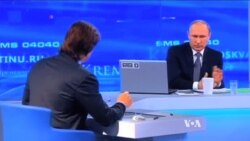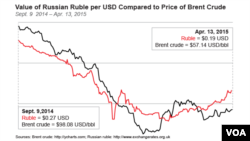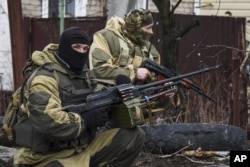President Vladimir Putin painted a rosy picture of the Russian economy Thursday, but economic experts say that its fortunes still will be weighed down by low world oil prices and the effect of Western sanctions imposed on Moscow because of its intervention in the Ukrainian conflict.
During a four-hour call-in show televised nationwide, Putin said the Russian economy, predicted by its central bank to contract by as much as 5 percent this year, could advance again in less than two years. That is faster than he predicted when the United States and European countries first announced the sanctions last year.
Despite last year’s devaluation, "the ruble has stabilized and strengthened," Putin said. "Experts believe that we have passed the peak of the problems. Nothing burst and everything is working."
Yearly event
Thursday's call-in show is an annual event, now in its 13th year, in which Putin takes questions from Russian audiences.
The wide-ranging event focused heavily on the country's contracting economy and the impact of Western sanctions and falling global oil oil prices. But it also included Putin's observations about Russia's strained relationship with the United States; the ongoing conflict in eastern Ukraine; and the February murder of Kremlin critic Boris Nemtsov.
His message generally was optimistic about Russia and critical of the United States.
"If we preserve a stable situation in domestic politics, preserve the current consolidation of society, we shouldn't fear any threats," said Putin, who enjoys 80 percent approval ratings in his country, The Associated Press reported.
Feodor Krasheninnikov, a political analyst based in Yekaterinburg, told VOA the moment reminded him of the late Soviet period when communist leaders proudly read lists of economic achievements – most of which were nonexistent.
"The list is there, but the accomplishments aren't. And viewers understand that completely," he said. "Putin's positive spin is unconvincing and he knows it."
Krasheninnikov said that while the call-in show normallly is a scripted Kremlin event, concerns over the economy had to be addressed.
"I think of the millions of questions submitted to Putin ... many had to do with the economy. I think they'd rather criticize the U.S. or Europe or talk about Ukraine.... But people want to talk about how life is getting harder," he said.
Indeed, Putin's former finance minister Alexei Kudrin was in the audience and argued the president's rosy picture of the economy was misguided. Viewers, too, questioned progress in agriculture, public utilities and small business growth, repeatedly asking the Russian leader to intervene personally.
Throughout the call-in, Putin downplayed capital flight out of Russia – estimated at more than $100 billion last year – as well as soaring inflation and unemployment, saying they had not had a catastrophic effect.
IMF predicts recession
The International Monetary Fund also is forecasting a recession in Russia this year, with falling prices for crude oil on the global market the key factor for Moscow's oil-dependent economy.
Asked in Washington about Putin's rosier assessment of the Russian economy, Christine Lagarde, the IMF managing director, did not alter her organization’s prediction. But she said, "I would not like anything better than to be proven wrong in any country where we forecast negative growth."
Roman Sheremeta, an economics professor at Case Western Reserve University in Cleveland, Ohio, told VOA that Putin's assessment of an improving economy is at odds with the 17 percent inflation it recorded last year and the growing effect of the sanctions.
"I see a big dissonance, a big difference with what actually is and what he actually claims," the professor said. "I really can't put my finger on who would trust this kind of message."
Sheremeta said Putin's favorable economic message is aimed at the Russian population, even if outside analysts dismiss it. "I don't see any prospect of the economy improving because the sanctions are going to hit even harder next year," he added.
Putin said Russia must use the time under Western sanctions "to reach new levels of development," Putin said, citing pressure to come up with substitutes for embargoed goods. "... I hope that this is encouraging us to develop high-tech industries with faster rates [of growth] than before."
Moscow wants respect
Putin also used the forum to point up the chilly relations between the United States and Russia, saying Washington must treat Moscow as an equal on the global stage before any reset in bilateral relations.
The United States tries to dominate international relations, Putin charged, adding that Russia still is "always open to cooperation."
Referring to the United States, Putin said "major superpowers that claim their uniqueness and consider themselves the only center of power in the world" need "vassals," not "allies."
Putin said that after World War II, Moscow tried to impose its model of development on many Eastern European countries by force, and "there was nothing good" in this. But "the Americans are acting in a similar way by trying to impose their model around the world," he added, saying they, too, would fail.
Asked about Putin's claim that the United States needs "vassals," former Lithuanian Prime-Minister Andrius Kubilius told VOA on Thursday that the Russia leader was probably reflecting "how he’d like to see Russia’s relations with its neighbors."
"He tries to create vassal states near Russia – Abkhazia, North Ossetia," he said. "I’d call myself a vassal – a vassal of the Western democracy, of the Western values that we are glad to realize in our country, and we’d love to see success of our friends in Ukraine in doing the same.... And we see here the responsibility of the whole Western world to help Ukraine to become such a state."
The Russian president also suggested that the United States had pressured some European leaders not to attend May 9 events in Moscow commemorating the 70th anniversary of World War II's end in Europe.
White House reaction
Reaction from the White House came quickly, as spokesman Josh Earnest said Russia has been helpful in some areas, such as in the Iran nuclear negotiations, and less so in others.
"We have acknowledged on a number of occasions that Russia played an important role alongside the P5+1 in our negotiations with Iran to try to carve a diplomatic pathway that would prevent Iran from developing a nuclear weapon," he said Thursday.
Earnest also said Iran was helpful in removing and destroying Syria's chemical weapons.
But he said Russia's actions in Ukraine run counter to what the U.S. expects from Moscow.
"What's also true is that there are expectations for influential world powers. One of those expectations is that they are going to respect the borders of sovereign countries," said Earnest.
Defends Iran arms sale decision
Putin defended his decision to clear the way for the possible sale of an S-300 air defense system to Tehran, saying it was a result of Iran's willingness to try to reach a settlement over its nuclear program.
Back in 2007, Moscow had signed a contract worth $800 million to supply Tehran with five S-300 batteries. But Russia froze the contract three years later after the United Nations Security Council imposed sanctions on Iran.
On Monday, hours after Moscow announced the decision to lift the ban, U.S. authorities expressed concern over the development.
The U.S. State Department said transfer of S-300 missiles to Iran would not violate existing U.N. Security Council sanctions. But the U.S. believes "this is not the time" for the sale, given unrest in the region.
Ukraine conflict
Russian Defense Minister Sergei Shoigu said Thursday at a Moscow security conference that the United States and its Western allies have "crossed all possible lines" in what he said was their drive to bring Ukraine under Western influence.
He said Western influence on Kyiv triggered Russia's annexation of the Crimean Peninsula, which led to an armed rebellion in Ukraine's east.
Russia has repeatedly denied Western assertions that it backs the pro-Russia rebels in eastern Ukraine and supplies them with equipment.
"There are no Russian troops in Ukraine," Putin said again Thursday during the call-in session.
His forceful answer was aimed at convincing a worried public, said Cristian Nitoiu of the IDEAS policy group at the London School of Economics.
But "there have been recently more and more images of Russian soldiers coming back in coffins, Russian soldiers being injured, being treated in secret hospitals," Nitoiu said. "And Russian society is increasingly becoming aware of this. And Putin knows that it is increasingly hard to keep this hidden."
Putin also said he does "not differentiate at all between Ukrainians and Russians. I believe they are the same people."
That’s part of the recurring narrative from the Kremlin, says Nicholas Redman of the International Institute for Strategic Studies.
"He actually likened [Ukrainian President Petro] Poroshenko’s election to a nonviolent coup, unlike the ‘violent’ one which ousted Yanukovych," Redman observed. "So there’s plenty there still to unsettle about Russian attitudes to Ukraine and Russian intentions."
Putin’s concept of 'one' people in Russia and Ukraine also validates his foreign policy, Nitoiu said. "Because if all Ukrainians are Russians, then Russia has a concrete motive to be engaged in Ukraine."
Nemtsov update
Putin was asked about the investigation into the slaying of opposition leader Nemtsov, who was gunned down February 27 while walking just outside the Kremlin with a woman. Though five Chechen suspects remain in custody, Putin said he wasn't sure the person who orchestrated the murder ever would be found.
Putin's critics hold him politically responsible for the killing of Nemtsov, a former deputy prime minister.
On Thursday, during Putin's call-in, Russian security services raided the Moscow office of the opposition Open Russia group. Opposition members said on Twitter that law enforcement officials, some wearing black ski masks, seized computers and files from the office.
Open Russia was founded by Mikhail Khodorkovsky, a former oil tycoon who spent a decade in jail over tax evasion and fraud after falling out with the Kremlin. He now lives in exile.
During the call-in show, Putin also suggested politics were behind Thursday's slaying of prominent Ukrainian journalist Oles Buzina, chief editor of Sevodnya or Today, near his home just outside of Kyiv. Buzina wrote pro-Russian opinion pieces for the Ukrainian daily paper.
"This is not the first political assassination," Putin said. "Ukraine is dealing with a whole string of such murders."
Contributors to this report include Charles Maynes from Moscow and Henry Ridgwell from London, with additional information from the Associated Press and Reuters.












